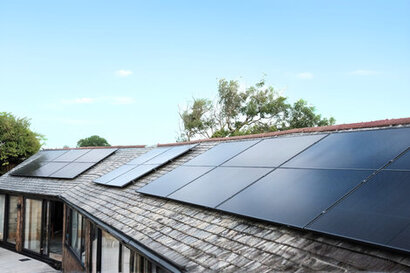
Local councils across the UK are outpacing private homeowners in their rate of solar energy adoption with 5.5 percent (99,146 homes) of all residential property owned or leased by councils having rooftop solar installed, compared to 5 percent of privately owned homes.
The highest rates of progress are among local authorities in Wales and Scotland, with 8.4 percent of council-owned homes in Wales and 7.9 percent in Scotland benefitting from rooftop solar, compared with 4.9 percent in England and 3.8 percent in Northern Ireland.
Across the UK, the highest-performing regions are North West Wales and North East Wales where more than one in five council-owned homes (23.6 percent and 21.0 percent) have solar panels installed. The next highest region is Scotland’s Aberdeen and North East, where 13.5 percent of council homes now have rooftop solar.
Currently, just 1.8 percent of council homes in London currently have rooftop solar installed. Low proportions of solar-powered council homes are also reported in Southern Wales (0.3 percent), South West Wales (1.9 percent), and Yorkshire and the Humber (2.1 percent).
“Many councils are already under immense financial pressure, so the fact that on a national scale they are outpacing private homeowners in their rooftop solar rollout is remarkable” said Mohamed Gaafar, CEO and co-founder of Gryd Energy. “But we’re still talking about very small numbers here and no one is really winning this race. Rates of rooftop solar deployment need to increase dramatically across the entire public and private housing landscape if we are to achieve the government’s clean energy targets by 2030. Many councils own thousands of residential properties. Imagine the impact and momentum that could be unlocked to tackle the clean energy transition if councils were supported and incentivised by the government to deploy rooftop solar to those portfolios at scale. Around 250,000 homes are built in the UK each year. That’s more than eight million square metres of prime solar roof space created annually - or 2,000 acres of solar farms that wouldn’t need to be built.”
While solar farms will continue to make an important contribution to Britain's clean energy future, the potential of domestic and commercial rooftop solar is just as important, if not more so.
Gryd Energy is working to solve the problem of high up-front installation costs through a unique subscription model that sees the business fund and manage the solar hardware for its entire 25-year life cycle. This allows local authorities and property developers to install rooftop solar systems with zero hardware costs and homeowners to start saving on their energy bills from day one.
“Last year, Ed Miliband said he wanted the government to unleash a solar rooftop revolution” added Mr Gaafar. “The government must now act on that ambition and put serious investment and policy support behind helping local authorities and homeowners to adopt the technology, become energy independent and reduce the burden on the national grid.”
For additional information:

